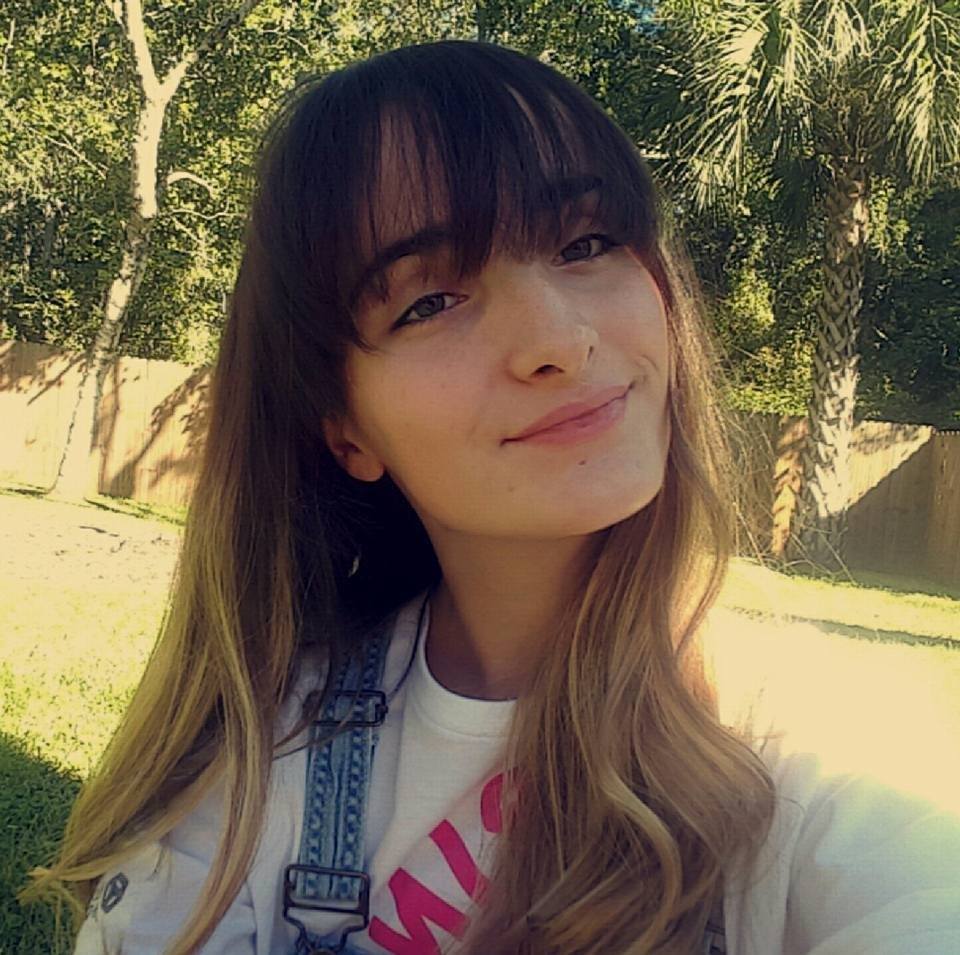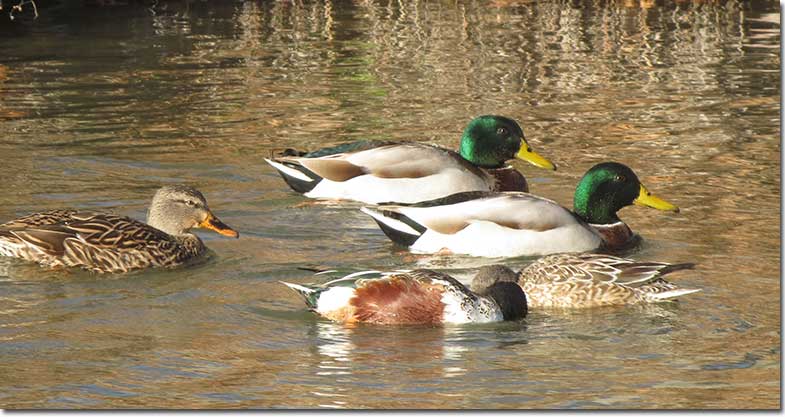
Have you ever wondered what a group of ducks is called? Seeing a group of ducks is common, but the names of these groups might surprise you.
In the wild, ducks tend to congregate in large numbers, often forming groups that consist of hundreds to even thousands of individuals.
But what is a group of ducks called? The common names for a group of ducks are flock, waddling, raft, brood, and team. Continue reading to learn about the different collective nouns for these birds and more!
On this page
What is a Group of Ducks Called?
Groups of ducks have different names depending on where they are and what they’re doing. The primary term for a group of ducks is a team.
Ducks are very social birds and feel safest when in a large group that consists of other ducks or even other waterfowl.
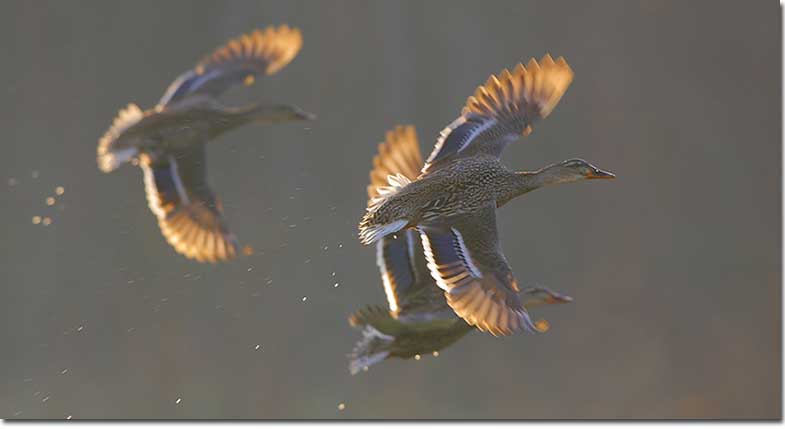
They hang in groups because the more birds, the more security there is.
This leads to significantly higher survival rates. A group of these birds offers more eyes which dramatically improves their ability to detect any predators that may be nearby.
Ducks are known to be very vocal birds, so any perceived threats are promptly shared with their fellow flock members, ensuring the whole group is aware and alert.
Why Is It Called A Team Of Ducks?
A flock of ducks flying together is often referred to as a “team.” This term likely stems from the observation that ducks in flight typically display a well-organized and tightly coordinated formation reminiscent of how a sports team would look on the field.
While it may require some imagination, the next time you see a group of ducks soaring through the sky, take a moment to observe them and see if you can see the resemblance!
Other collective nouns that are used for groups of ducks include:
- Flock
- Waddling
- Raft
- Brood
A flock is just another term for ducks that are in flight. Like a team of ducks, a group of ducks flying through the sky is called a flock. Additionally, a group of baby ducks is sometimes called a flock as well.
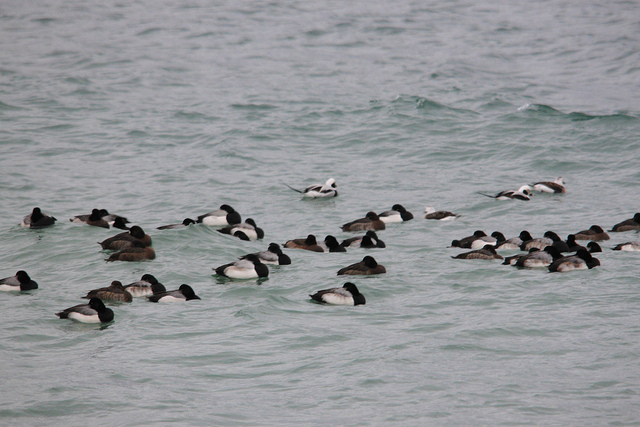
Many people associate ducks with waddling. Ducks have evolved to be excellent swimmers, which is the reason why ducks waddle. In order to swim well, ducks have webbed feet and slightly elevated back toes.
Furthermore, their feet are positioned toward the back of their bodies. All of these features cause them to waddle as they walk. A group of ducks is called a waddling when they’re on land.
A group of ducks in the water is called a raft. They got this name because when ducks gather closely on the water, they resemble a raft.
Ducks form rafts during the day and at night. However, they primarily form rafts at night for protection while sleeping.
The presence of a large group deters potential predators, as they are less likely to go after a duck that’s part of a group. Additionally, a raft provides better overall surveillance.
A group of baby ducks is called a brood when they’re on land. They’re called this because the parents brood their young in the nest.
How Often Do Ducks Group Together?
As stated previously, ducks are known to be highly social. In fact, they’re one of the most social bird species in the world. They form groups outside of breeding season and engage in harmonious activities.
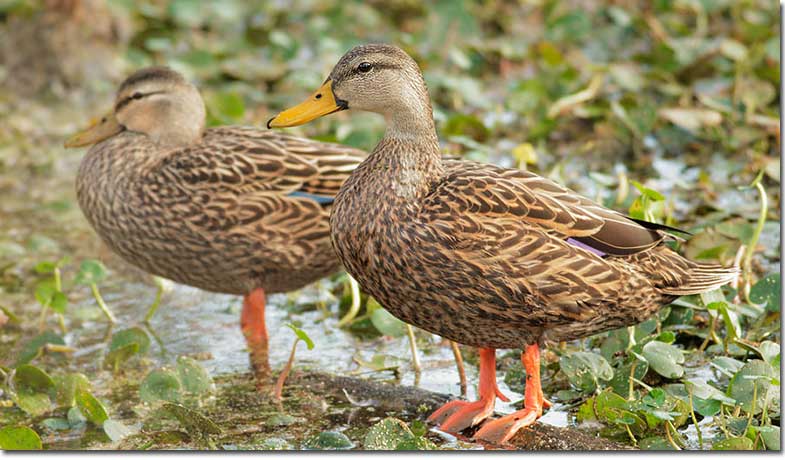
Like other bird species, it’s common for ducks to only tolerate their mates and young during the breeding season. They’re very territorial and aggressive during this time, protecting their mates from any intruders.
Once the breeding season ends, ducks go through a significant shift when it comes to their social dynamics. They become significantly more friendly and are ready to form large groups that consist of ducks and other types of waterfowl.
Related: What do ducks symbolize?
However, there are some instances of ducks gathering together during the breeding season. One reason for this behavior is gender imbalance within duck populations; male ducks often outnumber females.
As a consequence, a number of male ducks often face difficulties in finding a suitable mate. This prompts them to form flocks alongside other males, fostering companionship within their own kind.
Frequently Asked Questions
Are ducks called a flock?
Yes, a group of ducks is called a flock. Other common names for a group of ducks include flock, waddling, raft, brood, and team.
What is a group of two ducks called?
A pair of ducks is commonly referred to as a “brace.” Typically, a brace consists of 2 ducks, although occasionally, it may include 4 ducks. Ducks often travel in pairs because it increases their safety from predators and makes foraging more efficient. A brace may mate and raise their own brood of ducklings.
What does a flock of ducks mean?
A flock of ducks is a group of ducks that are flying through the sky. Additionally, a group of baby ducks is sometimes called a flock as well.
Conclusion
Groups of ducks can have different names based on the behavior they’re exhibiting. For example, a group of ducks in flight is called a “team,” a group of ducks that are in the water, whether they’re swimming or wading, is called a “raft,” and a group of ducks on land are called a “waddling.”
Most of us call a group of ducks a flock; this is understandable because a group of birds is universally known as a flock.
However, as we discussed in this article, many different terms can be used to describe a group of ducks. Each term carries its own meaning and is used in different contexts.
Next time you see a group of ducks, take the time to admire these birds. They’re truly unique, and now you’ll know what to call them based on the behavior they’re exhibiting!
Read next: What is a group of chickens called?

